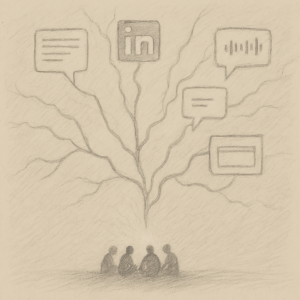When I was 22, I was hired by a small startup as employee number four. My job didn’t have a fancy title back then, but today we’d call it an SDR. I was there to cold call decision-makers and book meetings for my boss. That was it. I got the job because I was willing to work hard and could hold a conversation on the phone. Everything else, I learned on the job.
That job, in that form, barely exists anymore. It’s already been reshaped by digital tools, and we’re now at the point where AI agents are being marketed to do it entirely. Give it another year or two, and they probably will.
For someone like me, that isn’t frightening. I don’t believe AI will replace humans at the senior end of sales. It could, maybe. But it won’t. Big deals, big decisions—those will always involve people. Humans want to look other humans in the eye before making a commitment. If anything, I think we’ll see a renewed desire for in-person relationships as the digital noise increases.
But here’s the real problem: if AI replaces the early sales jobs—the meeting setters, the lead generators, the researchers—then where does the next generation of senior sellers come from?
I didn’t come out of the womb ready to close complex deals and manage multiple stakeholders. I learned that over time. I got better by doing real work that contributed to a team. And the reason I was given the chance to learn was because I was useful. Appointment setting was my tuition fee. It was hard, but it was valued.
This doesn’t just apply to sales. The same dynamic exists in marketing, operations, customer service. Entry-level roles are how people learn, grow, and gain context. They’re how companies build future leaders.
But AI is breaking that system. Many companies won’t reimagine entry-level roles—they’ll just erase them. Not out of cruelty, but because it’s cheaper and easier to do so. They’ll cut headcount, pat themselves on the back for efficiency, and pay large salaries to a small number of proven experts. Meanwhile, the ladder is gone.
The irony is that the companies who invest in talent—who train, mentor, and nurture—are the ones who will lose their people first. Because once someone’s experienced, they’ll be lured away by the big corporates with deep pockets and no training infrastructure. The ethical companies take on all the cost of development, and others reap the benefits.
I’m not criticising employees for leaving. People should do what’s right for them. But the system is broken. We’re turning the early years of work into a wasteland.
So what do we do?
I’m building AI tools that take a different approach. Tools that treat human input as essential—not optional. Tools that make marketers faster, sharper, and more aligned with the rest of their company. Tools that respect voice, expertise, and strategic thinking.
Our first product is in beta. It helps B2B marketing teams turn internal company knowledge into high-quality content: sales posts, outreach messages, blog articles, LinkedIn updates. It doesn’t replace marketers. It removes bottlenecks and amplifies insight from across the business—sales, founders, subject experts. It’s trained on your voice. It learns from your edits. It keeps humans in control.
And most importantly: it makes young talent better, faster. It gives them fingertip access to institutional knowledge. It makes learning visible. It gives them the scaffolding to become confident, strategic, high-value contributors.
That’s what I want AI to do. Not replace people, but raise them.
Because the question isn’t whether AI can do the work. It’s whether we still value what people become by doing it.
The ladder isn’t dead yet. But it needs defending. And redesigning. And I plan to keep building tools that help us do both.

